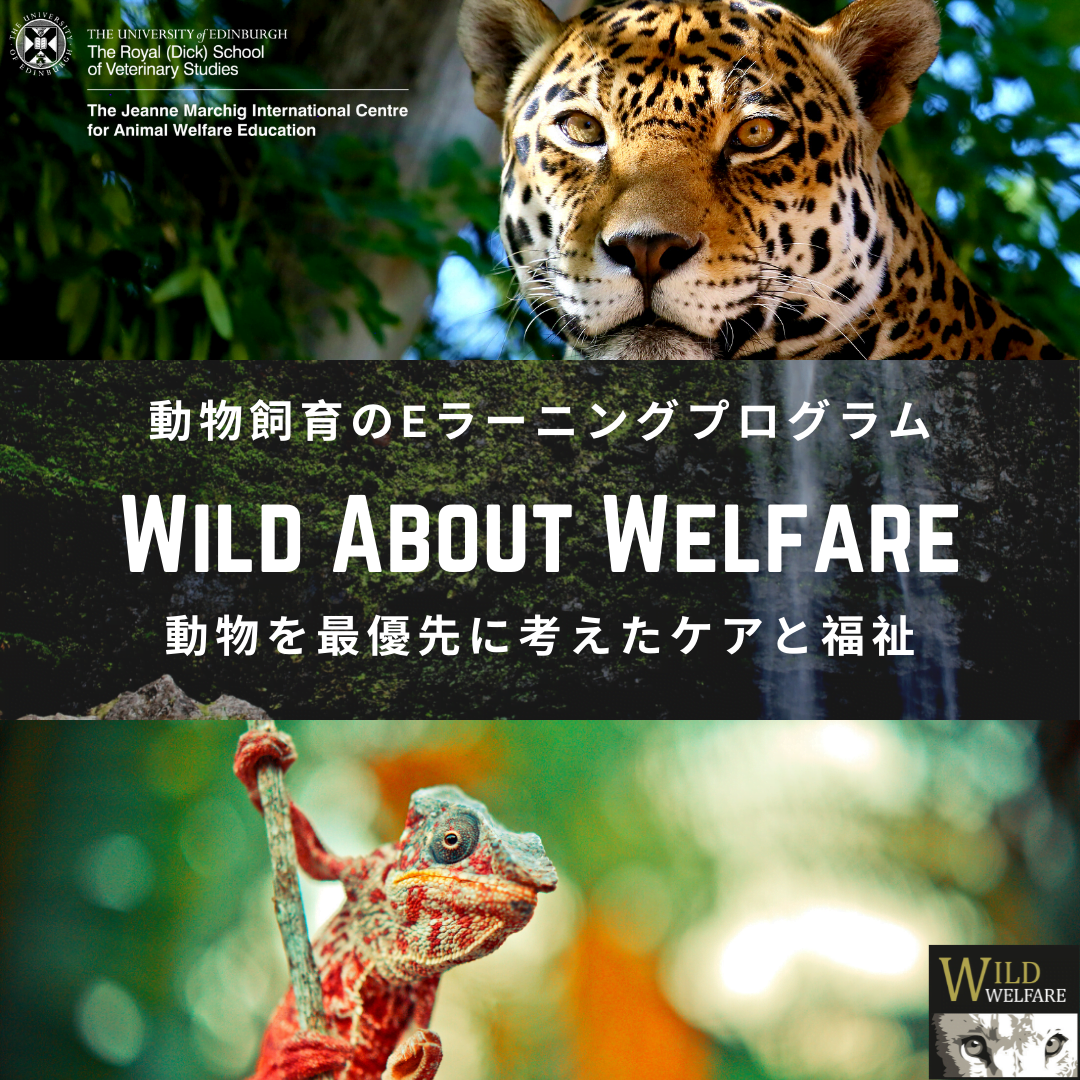Digital animal welfare programme launched in Japanese
Please scroll down to read the Japanese version of this release.
UK animal welfare charity Wild Welfare has launched a digital animal husbandry programme in Japanese, to support wildlife caregivers across Japan.
The unique, open-access online programme Wild About Welfare, is produced in collaboration with The Jeanne Marchig International Centre for Animal Welfare Education (JMICAWE) at the University of Edinburgh, Scotland.
Available in English since early 2021, the free, online programme now makes animal welfare education available to any Japanese speakers working with captive wildlife.
Wild Welfare’s acting UK director, Simon Marsh, said: “Ensuring animal welfare resources are available in people’s native languages is vital in helping to make certain our charity’s work really has an impact on captive wildlife in all corners of the globe.”
“The Wild About Welfare programme has been designed to upskill staff working with wild animals in captivity and give them the knowledge to be able to deliver good care and welfare.”
Wild Welfare’s estimates put the number of captive animal welfare facilities in Japan at more than 3,000. This huge number of facilities, coupled with the fact that animal welfare is still a relatively new concept within the country, means the charity’s work in Japan is extensive, as it operates to ensure the country’s captive wild animals living in these thousands of facilities are receiving good care and welfare.
The Wild About Welfare programme is an interactive resource that addresses the knowledge gaps that may result in captive animal suffering and gives animal care staff the tools they need to provide optimal welfare for animals living in captive facilities such as zoos, aquariums and wildlife centres.
Keiko Yamazaki, executive director of the Animal Literacy Research Institute and member of Japanese Coalition of Animal Welfare (JCAW), said: “The issues pertaining to captive wildlife in Japan are many. There is no legal definition of zoos. Exotic pets are popular which helps to boost the illegal wildlife trade.
“Educating all those involved in the care of wildlife as well as the general public on the welfare of these animals is of paramount importance to the nation. The digital learning program and its accessibility will indeed help to accelerate this education.”
Delivering bite-sized online modules on subjects such as animal behaviour, animal welfare needs and animal enrichment, the programme – which is accessible on smartphones, tablets and computers – can be taken one module at a time or as a complete course.
Designed to be used by animal carers, it provides practical learning exercises and encourages participants to really consider the species’ biology, as well as individual preferences, which helps towards making positive decisions for their welfare.
Wild Welfare has extensive experience in identifying where there are gaps in animal welfare standards in captive wildlife facilities and has published research into the most common captive animal welfare issues.
Simon Marsh added, “We can empower animal care staff to understand what good animal welfare looks like and what the animals in their care need. Education is key, and by offering people a way to access good quality information, we can help ensure they are better able to play their part in providing good welfare for the animals in their care.
The charity is already translating the programme into other languages to represent the scope of project countries it is active in around the world.
To access the Wild About Welfare animal husbandry e-learning programme, visit the charity’s website HERE.
The programme has been developed with kind support from The Silent Foundation1.
**Please scroll down to read the Japanese version of this release.
~ENDS~
Notes to Editors
- The Silent Foundation is dedicated to assisting what it calls the ‘silent sufferers’, which includes animals, the environment and human beings as long as they are overlooked and are not getting sufficient assistance from the public at large.
For more information or interview requests please contact Wild Welfare on communications@wildwelfare.org
Wild Welfare: Wild Welfare is a global organisation committed to improving animal welfare for captive wild animals. By working together with animal welfare organisations and captive wildlife facilities, including zoos, aquariums and sanctuaries, we achieve long-term and sustainable solutions to the most critical issues facing wild animals in captivity.
Our vision is a world where every captive wild animal is able to thrive and live a good life. Find out more at: wildwelfare.org. Registered charity in England and Wales No.1165941.
The Jeanne Marchig International Centre for Animal Welfare Education: Integrated within the R(D)SVS is the Jeanne Marchig International Centre for Animal Welfare Education (JMICAWE), which is committed to improving the health and welfare of animals through education, training, research, and promoting the important role of veterinarians in protecting animal welfare, as well as supporting capacity building in animal welfare within various parts of the world.
The JMICAWE is a hub of expertise on animal welfare education, collaborating with international partners to advance understanding of animal welfare issues. Find out more at www.ed.ac.uk/vet/jeanne-marchig-centre
オンライン動物福祉プログラムの日本語版がスタート
英国の動物福祉団体であるWild Welfareは、日本国内の野生動物の飼育者を支援するために、日本語によるオンライン動物飼育プログラムを開始しました。
類を見ないオープンアクセスのオンラインプログラム「Wild About Welfare」は、スコットランドのエディンバラ大学のThe Jeanne Marchig International Centre for Animal Welfare Education(JMICAWE)と共同で制作されています。
2021年初頭から英語で提供されているこの無料のオンラインプログラムが、この度、日本で野生動物を飼育している人たちからも利用できるようになりました。
Wild Welfareの英国ディレクター代理であるサイモン・マーシュは次のように述べています。「動物福祉に関する資料を諸外国の人たちの母国語で利用してもらうことは、我々の慈善活動が世界各地で飼育されている野生動物に変化を提供するために不可欠です。
Wild About Welfareプログラムは、飼育されている野生動物を扱うスタッフのスキルアップを目的としており、適切な世話と福祉を提供できる知識を身につけてもらうことができます」
Wild Welfareの推計によると、日本の飼育動物福祉施設の数は3,000以上です。このように膨大な数の施設があることに加え、動物福祉の概念は、日本ではまだ比較的新しいため、これらの数千の施設で飼育されている野生動物が適切な世話と福祉を受けていることを確認するために活動しており、日本での慈善活動は広範囲に渡ることを意味しています。
Wild About Welfareプログラムは、飼育動物の苦しみをもたらす可能性のある知識ギャップに対処し、動物園、水族館、その他、サファリパークや野生動物保護施設など、野生動物を飼育している施設で暮らす動物たちに最適な福祉を提供するために必要なツールを、動物管理スタッフに提供する対話式の教材です。
一般社団法人アニマル・リテラシー総研の代表理事であり、動物との共生を考える連絡会(JCAW)のメンバーでもある山崎恵子氏は、次のように述べています。「日本における野生動物の飼育に関する問題は多岐にわたります。動物園の法的な定義がありません。エキゾチックなペットは人気があり、野生動物の違法取引を助長しています。
野生動物の世話をしている人たちや一般の人たちに、野生動物の福祉について教育することは、我が国にとって最も重要なことです。このデジタル学習プログラムとそのアクセス性は、まさにこの教育を加速させるのに役立つでしょう」
このプログラムは、動物の行動、動物福祉のニーズ、動物のエンリッチメントなどのテーマを学習しやすいサイズのモジュールでオンライン提供しており、スマートフォン、タブレット、コンピュータからアクセスでき、1単元ずつでも、完全なコースとしても受講できます。
動物の世話をする人のために作られたこの教材は、実践的な学習演習を提供し、参加者が種の生物学的性質や個々体の好みを実際に考慮することを促し、動物の福祉のためにポジティブな決断を下すのに役立ちます。
Wild Welfareは、野生動物を飼育する施設の動物福祉基準のどこにギャップがあるかを見極めることに豊富な経験を持ち、飼育動物の福祉に関する最も一般的な問題に関する研究結果を発表しています。
サイモン・マーシュは次のように述べています。「私たちは、動物の世話をするスタッフに、良い動物福祉とは何か、世話をしている動物に何が必要かを理解してもらうことができます。教育は重要であり、質の高い情報にアクセスする方法を提供することで、飼育している動物たちに良い福祉を提供するための役割を果たすことができるようになります」
協賛する団体やサポーターは、すでにプログラムを他の言語に翻訳しており、世界中で活動しているプロジェクトに参加している国の範囲を表しています。
Wild About Welfareの動物飼育に関するeラーニング・プログラムにアクセスするには、当団体のウェブサイト:wildwelfare.org/resources-elearn-programme-japanese/ をご覧ください。
このプログラムは、The Silent Foundation1の支援を受けて開発されました。
~ 記 ~
編集者からのお願い
- The Silent Foundationは、動物、環境、人間など、見過ごされ、一般社会から十分な援助を受けていない「沈黙の受難者(silent sufferers)」と呼ばれる人々を支援することを目的としています。
詳しい情報や取材のお申し込みはWild Welfare(communications@wildwelfare.org)までお願いします。
Wild Welfare:飼育下の野生動物の動物福祉の向上に取り組む世界的な組織です。動物福祉団体や、動物園、水族館、野生生物保護区などの飼育下の野生動物施設と協力して、飼育下の野生動物が直面している最も重要な問題に対して、長期的かつ持続可能な解決策を実現しています。
私たちのビジョンは、飼育されているすべての野生動物が繁栄し、良い生活を送ることができる世界です。詳細はwildwelfare.orgをご覧ください。イングランド及びウェールズでの慈善団体登録番号はNo.1165941です。
The Jeanne Marchig International Centre for Animal Welfare Education:王立獣医学校にはJeanne Marchig International Centre for Animal Welfare Education(JMICAWE)が併設されており、教育・訓練・研究を通じて動物の健康と福祉を向上させ、動物福祉を守るための獣医学の重要な役割を推進するとともに、世界各地での動物福祉のための能力開発を支援しています。
JMICAWEは、動物福祉教育の専門家集団として、国際的なパートナーと協力しながら、動物福祉問題の理解を深めています。詳細は www.ed.ac.uk/vet/jeanne-marchig-centre をご覧ください。





